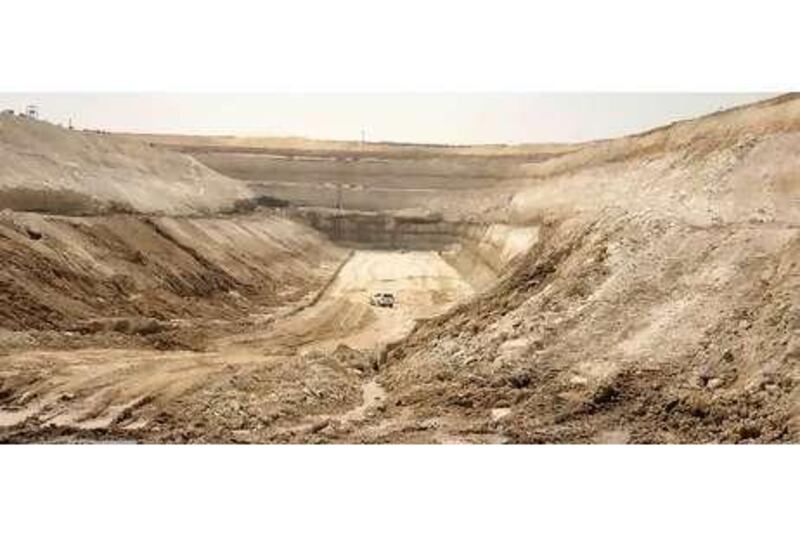When Limitless was formed in 2005, it was designed to be the overseas property counterpart to its Dubai World sister company, Nakheel. Saeed Ahmed Saeed, a former managing director of projects at Nakheel, became its chief executive and quickly set about buying land for ambitious developments in countries such as Jordan, Russia and Vietnam.
But such was the demand for property in Dubai at the time that Limitless also sought to rejuvenate the Jebel Ali area with its US$11 billion (Dh40.4bn) Downtown Jebel Ali. Launched in late 2006, about 250 plots at the sprawling development were snapped up by equally ambitious subdevelopers, with the remit to build hundreds of homes, offices and shops. Limitless, in the meantime, provided the land and infrastructure.
The only project the company built at the development is The Galleries, an eight-building mix of office space and apartments. It is also the company's only completed asset today. It said in February it had 220 staff, down from 500 at its peak. As sales of waterfront properties heated up, Limitless also took over development of the Arabian Canal, a proposed 75km waterway valued at Dh40.3bn and a 14,000 hectare city valued at Dh118.3bn.
The canal idea was originally conceived by Nakheel, which was busy dredging sand in order to create island hubs such as the Palm islands and The World. Although construction of the waterway began in the latter half of 2008, the work stalled within months. The timing of the financial crisis was therefore perhaps fortunate for the Arabian Canal project because Limitless had yet to begin selling plots of land, minimising its exposure.
The global crisis also put the brakes on the company's expansion overseas at a time when the only project that had started construction was Sanaya Amman, a Dh1.1bn twin-tower residential development in the heart of Amman, Jordan. With the similarities between Nakheel and Limitless, both in terms of their history and the problems they are now encountering in Dubai, the announcement on Saturday that Nakheel will take over the running of Limitless makes sense, analysts say.
As Dubai World tackles the repayment of Dh86.31bn of debt, the realignment is "aimed at setting united strategies and programmes to deal with the real estate sector", the Dubai Media Office said. Limitless declined to comment further. The move came less than a week after Nakheel said it would resume work on Jumeirah Park, Al Furjan, Jumeirah Village, Jumeirah Islands Mansions, Jumeirah Heights Clusters and Al Badrah as it settles outstanding bills with contractors.
"This is a time when Nakheel is rationalising projects," says Nabil Ahmed, the regional head of research at Deutsche Bank. "So I'm not so surprised that a single management team should take over pretty much everything in the real estate sector, making sure they are consolidating sales and moving ahead only with projects that are near completion and economically viable." Rizwan Shah, the director of capital projects at Deloitte, the consultancy firm, says when it comes to repaying its creditors, Limitless will probably adopt a similar arrangement to that of Nakheel.
Last week Nakheel said it had reached an agreement with 75 per cent of its trade creditors and had pledged to settle Dh4bn of claims within two weeks. "I don't think the Limitless plan is nailed down yet, but the presumption is that the same plan given to Nakheel would probably be given to Limitless, because it's tried and tested now," says Mr Shah. Limitless has far less exposure to contractor debt than Nakheel, with companies mainly owed money for the construction of The Galleries and the infrastructure work at Downtown Jebel Ali.
In mid-April, the developer was also granted an extra 90 days to repay a $1.2bn Islamic loan that was due on March 30."Limitless was only really involved in the construction of The Galleries in Dubai, everything else was about developing plots in the Jebel Ali area and overseas ? they really aren't as complicated as Nakheel," Mr Shah says. As a combined entity, Nakheel and Limitless have about 13 incomplete projects on their hands. This does not include the land bank that Limitless has overseas.
But whether the developers are under one roof or not, two major issues remain that will hamper the resumption of these projects: a shortage of bank funding and the oversupply of property in Dubai, says Majed Azzam, a property analyst at Al Futtaim HC Securities. "Limitless is a very small company with few projects and Nakheel is not in a position to fund Limitless's projects," he says. "Most of the money Nakheel has is going to the trade creditors and banks. The move to combine them in order to be able to control their problems better is not a quick fix for the overall issues."
As problems persist in overseas property markets, Limitless's foreign land bank is also not a short-term cure for the companies. "Limitless's land overseas is not substantial when compared to Emaar," says Mr Azzam. "It will take a long time to bring projects to fruition. They will still need to raise funding for any projects, with the development cycle taking three to five years." Despite Nakheel's pledge to settle outstanding debts with its contractors, JP Grobbelaar, a director at the property company Colliers International, says both firms might struggle to find contractors to help complete all of their outstanding projects. "Contractors aren't going to get involved unless they get paid," he says. "This is the problem Nakheel faces and is what Limitless will face as well."
agiuffrida@thenational.ae






